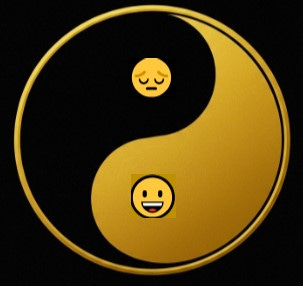Can We Still Experience Happiness After Eliminating all Suffering?
- Are happiness and suffering two sides of the same coin?
An interesting question I encountered elsewhere is highly relevant to our topics here. Below is to share the original question and my answer:
“If we could eliminate all suffering in the world, would we still be able to experience happiness?”
This is a good question, philosophical in some way.
Aristotle, among the first in recorded human history to consider happiness in a philosophical sense, did not seem to have included suffering as a pre-requisite for happiness. See here for a summary of what he considered as happiness.
.
In modern times, happiness has been scientifically defined as Subjective Well-being, which includes life satisfaction, positive feelings, and (low level of) negative feelings. (See detailed descriptions here).
In this definition, happiness does include (in reverse rating) negative feelings, which could be the results of suffering.
But that does not necessarily imply that without the negative feelings from suffering, we will not have happiness, as we may still experience positive feelings and life satisfaction.
Components of Subjective Well-being (i.e., Happiness) where “affect” is commonly called feelings. High levels of life satisfaction (globally and in major life domains) and positive affect, along with a low level of negative affect, indicate a state of happiness.
.
So based on the above, we could say that we would still be able to experience happiness even after we have eliminated (if possible) all suffering.
Here how we define “suffering” also worth some discussion, as what is considered as “suffering” may evolve.
In the question, by suffering I suppose it meant serious pain or distress, not just the common annoyances or unpleasantness, etc. that we might often experience in daily life.
Yet, some situations considered to be suffering in modern times, such as not having AC in a 90°F day, might be just life-as-usual, or a common annoyance, in ancient times or prehistoric era….
By the same token, some things we now see as everyday annoyances, or just life-as-usual, might be considered as “suffering” in the future, such as having to do hands-on driving when your FSD (full-self-driving) car would decide not to self-drive during a long-distance trip.
Or even in the same historic time period, suffering to one might not be suffering to another.
Ever seen someone acting as if it’s the end of the world for not getting the newest iPhone on the first day of its releasing?
Ah, it might be a bit of exaggeration to call that suffering, but hope you get my point.
What I am trying to say is, suffering, in part, is in our perception. In some cases, it might be more objectively suffering by any standard, in some others more subjective.
We may eliminate something we consider suffering at a certain time, but something else, maybe felt as much lesser a pain or distress previously, might become “suffering” later in our perceptions.
In that sense, “eliminating all suffering” could turn into a perhaps never-ending game against ourselves.
So, if you are worrying that we won’t be able to experience happiness after eliminating all suffering in the world, don’t worry. We may always “create” new suffering in our perceptions. Does that help?
But if you are wondering whether happiness and suffering are two sides of the same coin, the answer could be “yes” and “no”.
“Yes”, in somewhat a Taoist sense, that happiness and suffering are two opposing forces in their nature of joint existence.
It is true that people who have experienced deep suffering may appreciate happiness more profoundly; on the other hand, people who have experienced little suffering might be oblivious to the happiness they should appreciate.
“No”, in the sense that modern science of happiness has shown evidence that happiness and sadness are not just opposing forces, but may exist relatively independent of each other, or co-exist, and that they affect people in different ways, not just in opposing ways. See explanations here:
So the relationship of happiness and suffering is not so straight forward as in: If you have one, then you don’t have the other; nor in: There won’t be one without the other.
You may have both at the same time, though might be at different levels or saliency. On the other hand, one does not necessarily rely on the other to exist. To understand their complex and dynamic relationship, join us for more discussions!






